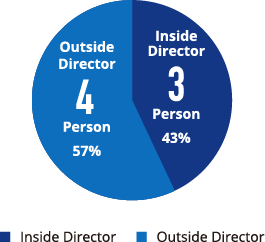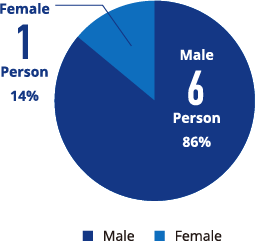Directors and Officers
The Company’s Board of Directors is comprised of seven directors (of which three are executive directors and four are outside directors who are non-executive directors). In addition to regular board meetings that are held monthly, the Company convenes extraordinary board meetings as necessary. The Board of Directors makes important management decisions and supervises the execution of the business by each director.
The Company has established the Audit and Supervisory Committee, which is comprised of three part-time directors. The Audit and Supervisory Committee meets regularly at a frequency of once a month, and it holds extraordinary meetings as necessary to share information on the formulation of audit plans, the status of auditing, and other topics among the committee members.
The Audit and Supervisory Committee members attend board meetings and other important meetings and appropriately conduct supervision over management through audit procedures including inspection of important documents based on the audit plan and questions for directors and employees. The members also strive to improve the effectiveness and efficiency of auditing through close cooperation with the Audit and Supervisory Committee, Internal Audit Office, and accounting auditors.
The Company has also set up the Nomination and Remuneration Committee, which is comprised of four independent outside directors and one representative director. Members of this committee deliberate on the election of directors based on the criteria for the nomination of director candidates and the criteria regarding their independence as well as on the roles of and contributions by each director, the evaluation of the Group’s business performance, and progress vis-à-vis its performance targets based on the criteria regarding directors’ remuneration. It then submits recommendations to the board of directors.
| Title | Name | Board of Directors |
Audit and Supervisory Committee |
Nomination and Remuneration Committee |
|---|---|---|---|---|
| President and Representative Director |
Hiroshi Yamada | ◎ | ○ | |
| Executive Vice President and Director, Executive Officer, General Manager of Sales |
Kurio Noritake | ○ | ||
| Director, Executive Officer, General Manager of Production |
Shinichi Hirano | ○ | ||
| Independent Outside Director | Kensaku Mizutani | ○ | ○ | ○ |
| Independent Outside Director (Audit and Supervisory Committeemember) |
Saei Ito | ○ | ◎ | ◎ |
| Independent Outside Director (Audit and Supervisory Committeemember) |
Tetsuichi Taniguchi | ○ | ○ | ○ |
| Independent Outside Director (Audit and Supervisory Committeemember) |
Tomoko Achiwa | ○ | ○ | ○ |

- Ratio of the Outside Director

- Gender Ratio of the Directors

Criteria regarding the Election of Officers
- Nomination procedures
The Company has set up the Nomination and Remuneration Committee, which is comprised of four independent outside directors and one representative director.
Based on the following election criteria and independence criteria, the Nomination and Remuneration Committee examines qualifications of each director candidate and elects directors at board meetings with consent from the Audit and Remuneration Committee. - Criteria regarding the Election of Inside Directors
(1)
A person who understands the Company’s history, climate, and culture and possesses a superior business acumen and business judgment needed to keep Shinwa-ism alive
(2)
A person who possesses expert knowledge on the Group’s business, as well as outstanding foresight, planning and decision-making abilities, unifying strength, and leadership
(3)
A person who possesses the humanity and moral values required of a director
(4)
A person who does not have any health concerns that would prevent him or her from performing the duties of an inside director
- Criteria regarding the Election of Outside Directors
(1)
A person who possesses expert knowledge in such fields as management, accounting/financing, law, administration, and socio-cultural understating and has made appropriate achievements in his or her respective field
(2)
A person who possesses the humanity and moral values required of a director
(3)
A person whose concurrent position(s), if any, are appropriate and do not interfere with the performance of the duties of an outside director
(4)
A person who does not have any health concerns that would prevent him or her from performing the duties of an outside director
- Criteria regarding the Independence of Outside Directors
(1)
For outside directors of the Company to be considered as independent by the Board of Directors, they must be neutral and independent of the Company’s management, with none of the following criteria applicable thereto. (Hereinafter, outside directors who are considered to be independent are referred to as “independent officers.”)
- A person who is involved in the execution of the business of the Group
- A person who is an employee or an executing person of a firm for which the Group is a major client
- A person who is a major client of the Group or an executing person of a firm that is a major client of the Company
- A person who owns 10% or more of the Company’s voting rights either directly or indirectly or an executing person of a firm to which such a person belongs
- A person of a firm 10% or more of whose voting rights the Group owns either directly or indirectly or an executing person of such a firm
- An accounting expert such as a consultant and certified public accountant or a legal expert such as an attorney who receives a large amount of money or other economic benefit(s) from the Group aside from the officer’s remuneration
- A person who belongs to an audit firm that conducts a statutory audit of the Company
- A person who is an executing person of a firm for which an executing person of the Group acts as an outside officer currently or has acted as such within the past three years
- A person who is a close relative of the following:
(a) A person to whom any of the aforementioned criteria (1) - (8) applies
(b) A person who is an important executing person of the Group
(c) A persvon to whom the criteria (b) above was applicable within the past three years
(2)
Other than the criteria of the preceding section, independent officers must not be involved with circumstances that would cause them to be reasonably considered to be unable to fulfill the duties of an independent outside director.
(3)
Independent officers shall strive to maintain independence as stipulated herein until they leave office and immediately notifies the Company when they cease to be independent as stipulated herein.
Criteria for Officers’ Remuneration
-
Procedures for remuneration decisions
(1)
Nomination and Remuneration Committee
The Company has set up the Nomination and Remuneration Committee, which is comprised of four independent outside directors and one representative director, with a view toward ensuring the objectivity and transparency of the procedures for deciding on remuneration for officers and executive officers.(2)
Remuneration decision method
The amount of remuneration for directors is determined at a board meeting after the Nomination and Remuneration Committee has undertaken deliberations on the roles of and contributions made by each director and on the evaluation of the Group’s business performance and progress vis-à-vis its performance targets based on the policy hereof. The amount of remuneration for a director who is a member of the Audit and Supervisory Committee is determined by the Audit and Supervisory Committee. -
Basic Approach to Officers’ Remuneration
The Company regards a system for its officers’ remuneration as “a mechanism for appropriate risk-taking to realize continual improvement of corporate value and sustainable growth of the Group over the mid- and long-term based on a basic approach to corporate governance,” and builds and operates a system that:◇
Possesses a high level of “transparency,” “fairness,” and “rationality,” which allows the Company to fulfill its accountability to shareholders and other stakeholders;
◇
Is linked to medium- and long-term corporate value to motivate employees to enhance sustainable corporate value over a medium- and long-term; and
◇
Makes it possible to recruit and retain talented human resources capable of embodying Shinwa-ism and realizing Our Mission, while at the same time responding to the mandate given by shareholders.
- Level of Remuneration
The level of officers’ remuneration is determined by making annual comparisons and verifications with the median among listed companies, and the levels of officers’ remunerations among those in the same industry (manufacturing/metal), of the same size (in terms of market capitalization, business scale, etc.), and from other business sectors, based on objective data from officers’ remuneration surveys conducted by third-party research organizations. - Composition of Remuneration
(1)
Inside directors
1)
Components
The composition of inside directors’ remuneration is as follows:a)
A “fixed remuneration” (monetary remuneration) for each position shall be paid;
b)
As an incentive to motivate inside directors to improve corporate value over the short-term, a “performance-based remuneration” (monetary remuneration), which is linked to progress in performance targets in each fiscal year, shall be paid; and
c)
As an incentive to motivate inside directors to share value with shareholders and improve corporate value over the medium- and long-term, a “stock-related remuneration” shall be paid.
2)
Percentages of components of remuneration
The Nomination and Remuneration Committee deliberates on the percentages of each component in accordance with the following criteria:
a)
The ratio of fixed remuneration to performance-based remuneration shall be 6:4; and
b)
Of the performance-based remuneration, the ratio of monetary remuneration to stock-related remuneration shall be 6:4.
3)
Basis for calculation of performance-based remuneration
The Nomination and Remuneration Committee deliberates on the calculation of performance-based remuneration based on the following criteria:
a)
(Short-term incentive remuneration) = (Performance-based monetary remuneration) = (Fixed remuneration) × (Ratio of the short-term performance-based monetary remuneration) × (% achievement of performance targets)
* “% achievement of performance targets” is the percentage of achievement of operating income in a single fiscal year (consolidated, IFRS).(2)
Outside directors1)
Components
The composition of outside directors’ remuneration is as follows:
a)
Only a “fixed remuneration” (monetary remuneration) for each position shall be paid;
b)
Incentive remuneration, such as performance-based remuneration or stock-related remuneration, shall not be paid.
2)
Percentages of components of remuneration
Outside directors receive fixed remuneration only and no incentive remuneration based on business performance.



